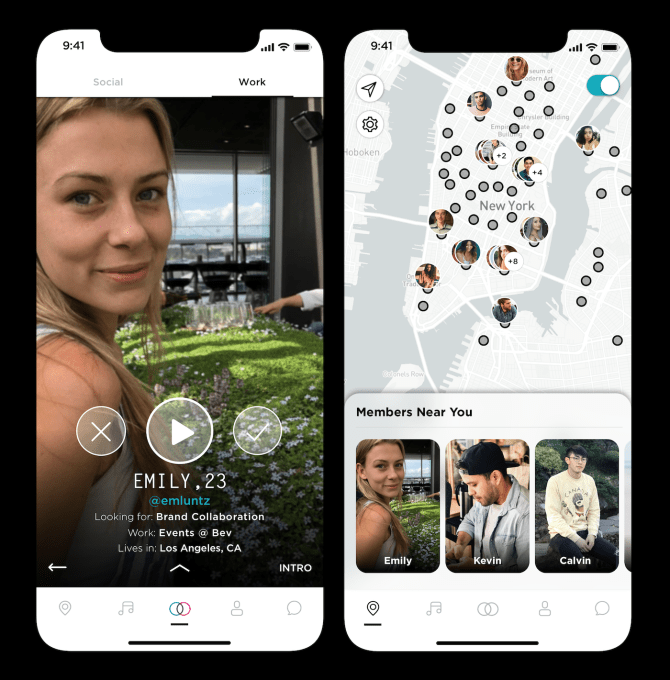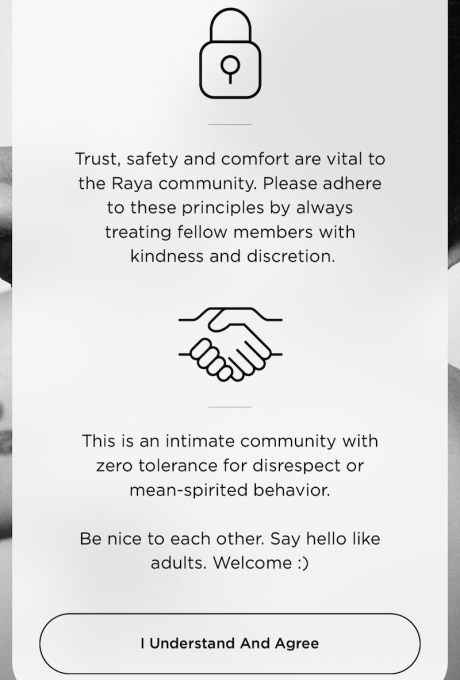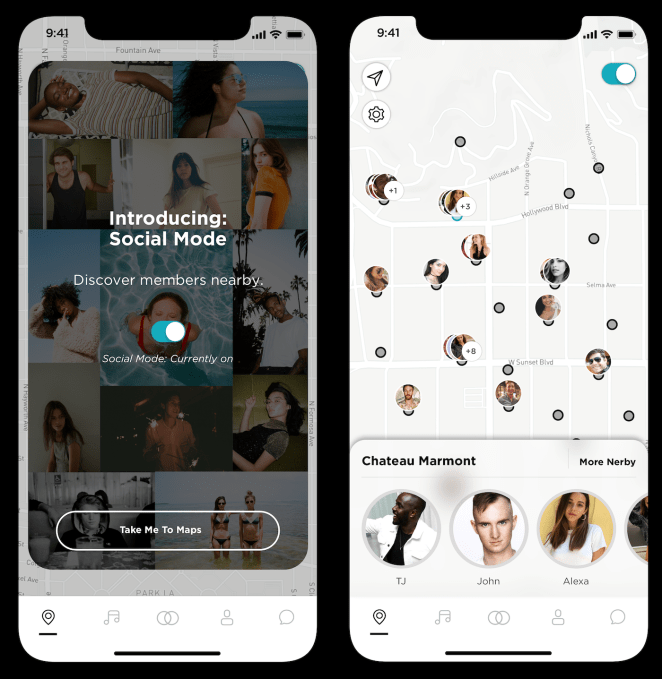The swipe is where the similarity ends. Raya is less like Tinder and more like a secret society. You need a member’s recommendations or a lot of friends inside to join, and you have to apply with an essay question. It costs a flat $7.99 for everyone, women and celebrities included. You show yourself off with a video slideshow set to music of your choice. And it’s for professional networking as well as dating, with parallel profiles for each.
Launched in March 2015, Raya has purposefully flown under the radar. No interviews. Little info about the founders. Not even a profile on Crunchbase’s startup index. In fact, in late 2016 it quietly acquired video messaging startup Chime, led by early Facebooker Jared Morgenstern, without anyone noticing. He’d become Raya’s first investor a year earlier. But Chime was fizzling out after raising $1.2 million. “I learned that not everyone who leaves Facebook, their next thing turns to gold,” Morgenstern laughs. So he sold it to Raya for equity and brought four of his employees to build new experiences for the app.

Now the startup’s COO, Morgenstern has agreed to give TechCrunch the deepest look yet at Raya, where the pretty, popular and powerful meet each other.
Temptation via trust

Raya COO Jared Morgenstern
“Raya is a utility for introducing you to people who can change your life. Soho House uses physical space, we’re trying to use software,” says Morgenstern, referencing the global network of members-only venues.
We’re chatting in a coffee shop in San Francisco. It’s an odd place to discuss Raya, given the company has largely shunned Silicon Valley in favor of building a less nerdy community in LA, New York, London and Paris. The exclusivity might feel discriminatory for some, even if you’re chosen based on your connections rather than your wealth or race. Though people already self-segregate based on where they go to socialize. You could argue Raya just does the same digitally.
Morgenstern refuses to tell me how much Raya has raised, how it started or anything about its founding team beyond that they’re a “Humble, focused group that prefers not to be part of the story.” But he did reveal some of the core tenets that have reportedly attracted celebrities like DJs Diplo and Skrillex, actors Elijah Wood and Amy Schumer and musicians Demi Lovato and John Mayer, plus scores of Instagram models and tattooed creative directors.
R aya’s iOS-only app isn’t a swiping game for fun and personal validation. Its interface and curated community are designed to get you from discovering someone to texting if you’re both interested to actually meeting in person as soon as possible. Like at a top-tier university or night club, there’s supposed to be an in-group sense of camaraderie that makes people more open to each other.
aya’s iOS-only app isn’t a swiping game for fun and personal validation. Its interface and curated community are designed to get you from discovering someone to texting if you’re both interested to actually meeting in person as soon as possible. Like at a top-tier university or night club, there’s supposed to be an in-group sense of camaraderie that makes people more open to each other.
Then there are the rules.
“This is an intimate community with zero-tolerance for disrespect or mean-spirited behavior. Be nice to each other. Say hello like adults,” says an interstitial screen that blocks use until you confirm you understand and agree every time you open the app. That means no sleazy pick-up lines or objectifying language. You’re also not allowed to screenshot, and you’ll be chastized with a numbered and filed warning if you do.
It all makes Raya feel consequential. You’re not swiping through infinite anybodies and sorting through reams of annoying messages. People act right because they don’t want to lose access. Raya recreates the feel of dating or networking in a small town, where your reputation follows you. And that sense of trust has opened a big opportunity where competitors like Tinder or LinkedIn can’t follow.
Self-expression to first impression
Until now, Raya showed you people in your city as well as around the world — which is a bit weird since it would be hard to ever run into each other. But to achieve its mission of getting you offline to meet people in-person, it’s now letting you see nearby people on a map when GPS says they’re at hot spots like bars, dance halls and cafes. The idea is that if you both swipe right, you could skip the texting and just walk up to each other.
“I’m not sure why Tinder and the other big meeting-people apps aren’t doing this,” says Morgenstern. But the answer seems obvious. It would be creepy on a big public dating app. Even other exclusive dating apps like The League that induct people due to their resume more than their personality might feel too unsavory for a map, since having gone to an Ivy League college doesn’t mean you’re not a jerk. Hell, it might make that more likely.

But this startup is betting that its vetted, interconnected, “cool” community will be excited to pick fellow Raya members out of the crowd to see if they have a spark or business synergy.
That brings Raya closer to the Holy Grail of networking apps where you can discover who you’re compatible with in the same room without risking the crash-and-burn failed come-ons. You can filter by age and gender when browsing social connections, or by “Entertainment & Culture,” “Art & Design,” and “Business & Tech” buckets for work. And through their bio and extended slideshows of photos set to their favorite song, you get a better understanding of someone than from just a few profile pics on other apps.
Users can always report people they’ve connected with if they act sketchy, though with the new map feature I was dismayed to learn they can’t yet report people they haven’t seen or rejected in the app. That could lower the consequences for finding someone you want to meet, learning a bit about them, but then approaching without prior consent. However, Morgenstern insists, “The real risk is the density challenge.”
Finding your tribe
Raya’s map doesn’t help much if there are no other members for 100 miles. The company doesn’t restrict the app to certain cities, or schools like Facebook originally did to beat the density problem. Instead, it relies on the fact that if you’re in the middle of nowhere you probably don’t have friends on it to pull you in. Still, that makes it tough for Raya to break into new locales.
But the beauty of the business is that since all users pay $7.99 per month, it doesn’t need that many to earn plenty of money. And at less than the price of a cocktail, the subscription deters trolls without being unaffordable. Morgenstern says, “The most common reason to stop your subscription: I found somebody.” That “success = churn” equation drags on most dating apps. Since Raya has professional networking as well, though, he says some people still continue the subscription even after they find their sweetheart.

“I’m happily in a relationship and I’m excited to use maps,” Morgenstern declares. In that sense, Raya wants to expand those moments in life when you’re eager and open to meet people, like the first days of college. “At Raya we don’t think that’s something that should only happen when you’re single or when you’re 20 or when you move to a new city.”
The bottomless pits of Tinder and LinkedIn can make meeting people online feel haphazard to the point of exhaustion. We’re tribal creatures who haven’t evolved ways to deal with the decision paralysis and the anxiety caused by the paradox of choice. When there’s infinite people to choose from, we freeze up, or always wonder if the next one would have been better than the one we picked. Maybe we need Raya-like apps for all sorts of different subcultures beyond the hipsters that dominate its community, as I wrote in my 2015 piece, “Rise Of The Micro-Tinders”. But if Raya’s price and exclusivity lets people be both vulnerable and accountable, it could forge a more civil way to make a connection.
from TechCrunch https://ift.tt/2G2sZ4c
No comments:
Post a Comment